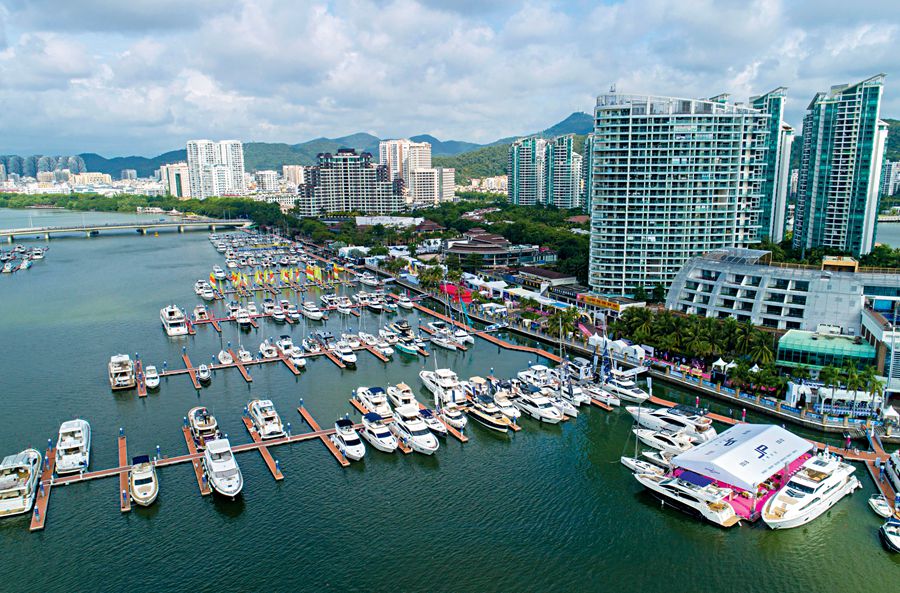A decade after the global financial turmoil of 2008, the world economy has once again came to a crossroads. Rising protectionism and unilateralism as well as escalating trade and investment disputes impinge on the international industrial pattern and financial stability, undermining the confidence of international investors. In this context, the future of the world economy and global governance drew widespread attention at the G20 Osaka Summit which concluded late June in Japan.

On June 20, 2019, the Hainan provincial government announces the “Implementation Plan for the Free Running of Yachts in China (Hainan) Free Trade Zone in Hainan, Hong Kong, and Macao.”
In his speech on the world economy and trade at the G20 Osaka Summit delivered on June 28, Chinese President Xi Jinping noted that it is the responsibility of leaders of the world’s major economies to chart the course for the global economy and global governance at a crucial time, as well as to inject confidence into the market and bring hope to the people.
As a responsible country, China contributed its wisdom and solutions to getting the world out of the predicament in development.
Instead of returning to beggar-thy-neighbor policies, China has been devoted to removing man-made fences in global trade in line with economic laws. Keeping abreast of the development trend, it has been embracing development opportunities and seeking higher-level cooperation and win-win outcomes by opening wider to the outside world. China acknowledges the fact that countries in the world are inextricably linked to each other and calls for visionary cooperation on the basis of common interests.
To foster driving forces for global development, China stresses high-quality development through reform and innovation. The expansionary monetary policy implemented over the past decade after the 2008 financial crisis failed to restore the world economy to its pre-crisis level. The global economy cannot be stimulated by massive demands, but should be fueled by new technologies, industries, and business models fostered in supply-side structural reform.
In terms of efforts to improve the global governance system, China champions the role of the G20 in promoting open, inclusive, balanced, and shared development. The G20 governance framework should play a role in improving the multilateral trade system, thus prompting the World Trade Organization to play a better role. China contends that the international financial and monetary system should be overhauled on the basis that no systematic financial risks break out. China also advocates the implementation of the Paris Agreement in mitigating global climate change, and calls for efforts in improving energy governance, environment protection, and digital governance.

The first China International Import Expo held in Shanghai in November 2018 attracts many foreign businesspersons.
China’s approach to fixing bottleneck problems in global development is to create space for growth by reaching bilateral and multilateral agreements. China seeks to push forward the forging of the Regional Comprehensive Economic Partnership, quicken the negotiations on the China-EU Comprehensive Investment Agreement and the China-Japan-South Korea Free Trade Agreement. China channels more resources into building connectivity under the Belt and Road Initiative with the aim of unleashing greater growth momentum and enabling more countries and regions to integrate into economic globalization.
China has also taken the initiative in expanding imports to boost global economic growth. In response to uncertainties in the global macro-economic condition, China doesn’t adopt a zero-game mentality, nor engages in vicious competition with other economies. Rather, it has voluntarily lowered tariffs on imported goods, removed non-tariff barriers, and slashed institutional costs. It will hold the second China International Import Expo to expand imports. With these measures, China continues to unleash its domestic demand to boost the global economy.
China also continues opening-up and cooperation with countries across the world. Over the past years, it has explored ways and means to implement the pre-establishment national treatment plus negative list management system in attracting foreign investment. Items on the negative list were reduced from some 190 in 2013 to just 45 in 2018 and has shrunk further in 2019. China further expanded foreign investors’ market access to agriculture, mining, manufacturing, and the service sector. At the same time, China set up the China (Shanghai) Pilot Free Trade Zone and Hainan Free Trade Port in the pursuit of further opening-up and achieving more inclusive cooperation with partners from across the world.
The country is also working to build a new open and inclusive economic system. On the one hand, it has introduced a host of measures to improve the business climate. The new foreign investment law to go into effect on January 1, 2020 introduces a mechanism of punitive compensation for intellectual property rights infringement, and intensifies protection of rights from the perspective of civil and criminal laws.
On the other hand, China will remove all restrictions on foreign investment apart from those on the negative list to ensure domestic and foreign enterprises compete on a level playing field. Foreign businesses will also have a smoother channel to file complaints.
The gathering of the G20 summit was initiated as a response to a financial crisis and thus has always put the coordination of macro-economic policies among global economies on top of its agenda. However, the world economy has not yet recovered from the 2008 turmoil, and global order is facing subversive challenges. At the G20 Osaka Summit, which focused on the future of economic globalization, China showed the world its firm commitment to charting the course for the world economy and global governance.
CHEN JIANQI is a professor and deputy director of the World Economics Department of the Institute of International Strategy at the Party School of the Communist Party of China Central Committee.

